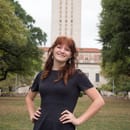One thing I struggled the most with while living in low Asian-populated cities was dealing with stereotypes about Asians. I was almost always expected to be the super smart kid who was good at math and played at least one instrument.
However, unlike everyone’s expectations, I didn’t fit into such stereotypes and my friends often called me the “cool Asian” just because I was “different from the Asians they’ve seen.”
Coming to the University of Texas at Austin surprised me a lot because of the diversity, even within the Asian population.
During my freshman year, I learned in my “Asian-Americans in Education” class that such stereotypes I had to face as a child were labeled as the “Model Minority Myth” and it made me wonder if other Asian-American students on campus had to face them too, and what kind of effects it had on them.
The Model Minority Myth: How bad is it, you may wonder.
“Oh, you should be good at math!”
“You’re going to be a doctor, right?”
These are only some of the statements Ralph Lee, a Filipino sophomore studying Management Information Systems (MIS) at the University of Texas at Austin, said he constantly heard when he was growing up.
“They assume that I should fit into this perfect mold that every Asian should fit into, and it’s something that was very difficult to deal with while growing up,” Lee said. “I had to be perfect at everything I did and work towards goals that I didn’t care about.”
These cultural expectations and stereotypes are defined by the American Psychological Association as the Model Minority Myth. It refers to certain expectations placed on Asian-Americans, specifically that each individual will be highly intelligent, wealthy, self-reliant and obedient.
“In other words, the model minority myth encompasses beliefs or biases about the incredibly large and heterogeneous group of people known as Asian-Americans,” said Amy Tao-Foster, a counselor at the Counseling and Mental Health Center of UT Austin. “These beliefs often include high expectations about work and educational performance and a submissive, complicit, obedient nature, assumptions about intelligence educational levels, access and working styles.”
Though these expectations and stereotypes may seem complimentary, according to Asian-American students at UT, more students explained that the expectations that were placed on them caused more negative pressure rather than positive.
“The model minority myth is harmful on an individual level because it puts pressure on Asian-Americans to be successful,” Sarah Tang, a sociology sophomore said. “And it devalues Asian-American achievements.”
“It wasn’t hard to deal with when I was younger because I didn’t understand the negative effects of the stereotypes,” Tang said. “As I got older, it became more apparent to me that race played a role in determining the places in society in which I fit. “Though I loved playing basketball, I quit before my freshman year of high school because I felt more and more as though my identity as an Asian-American was not welcomed in the context of a basketball team.”
Finance sophomore Rey Shah and Abby Gail Triño, Mathematics and Actuarial Sciences sophomore, hold similar opinions on the model minority myth
“As an Indian-American, people feel as if they can safely make the assumption that I was born into my ambition and discipline,” Shah said. “That somehow my work ethic, or any success I encounter in life, is at the hands of my parent and ancestors, working their Indian try-hard magic on me.”
Triño found herself doing activities not out of enthusiasm, but out of a desire to conform to the stereotypes of being better than others.
“The stereotype of a model minority implied that an Asian had to be the best at everything,” Triño said. “I found myself practicing to improve my skills, not because of the passion I had for the activity, but to not be bettered by someone else.”
Not only has the model minority myth and stereotypes pressured students, but it has also triggered many students, mentally and psychologically.
Tao-Foster explained how in the Asian-American Voice group students discuss a wide variety of issues that can range from family pressures about academics and career choices to experiences of racism and racial identity with additional conflicts on not feeling “Asian enough” and feeling pressured to assimilate to the dominant culture.
In addition, Tao-Foster explained that Asian American students are not provided the same sort of support, consideration, or outreach as other students with historically marginalized identities, due to factors like the model minority myth.
“The myth and stereotypes is not just a mental and psychological issue,” Tao-Foster said. “Asian-Americans may feel the need to intentionally reject the model’s stereotypes and react by engaging in high-risk behaviors such as substance use, misuse and abuse.”
When asked what students, parents and educators can do to fight against this model minority label, Tao-Foster said that the best way was for students to recognize the harmful effects and unrealistic pressures that the myth places on Asian Americans, and to intentionally recognize and cut down on the amount of comparison to those who are perceived as successful.
“Parents can consider the unique experiences of second generation students, including the struggles navigating two opposing value systems, and recognize the harm effects of placing pressure on their children, including how much distress comes with comparison,” Tao-Foster said. “Educators can recognize that Asian Americans experience issues of marginalization and racism even though there is ‘representation’ in the university.”
“My journey here hasn’t been somehow easier because I’m Asian. The truth is that I’ve had to work just as hard as anyone else to be able to attend this university,” Lee said. “Yes, I am Filipino, and I’m proud of that fact, but at the end of the day, I see myself just like everyone else on this campus.”
“A Longhorn,” Lee said.


